- About Us
- Columns
- Letters
- Cartoons
- The Udder Limits
- Archives
- Ezy Reading Archive
- 2024 Cud Archives
- 2023 Cud Archives
- 2022 Cud Archives
- 2021 Cud Archives
- 2020 Cud Archives
- 2015-2019
- 2010-2014
- 2004-2009
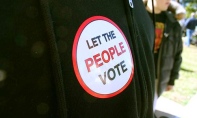 |
December 2009 - On Civil Rights: |
Every election cycle I find myself dusting off one particular soapbox. November 2009 was no different. In fact, the soapbox held more import this year. Mainers were given the opportunity to vote on several divisive topics; taxation, medical marijuana and same sex marriage. I have a problem with the fact this last issue was on the ballot at all and not because I oppose it. My problem with this relates directly to my soapbox.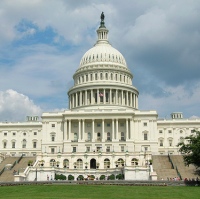
Here we go.
We do not live in a democracy.
Whoa, I know. Now, some of you will be wholly unsurprised by this statement. Others will be writing me off as a radical or terribly misinformed person. Everybody just hear me out.
The United States of America is a constitutional republic. And yes there is a difference.
Democracy is a system of government entirely driven by the people. A true democracy places all of the decision making authority on the people while a representative democracy allows the people to elect officials to protect their interests. A constitutional republic also relies on elected officials, but those officials are beholden to the constitution, not just the interests of their constituents. Our constitutional republic just so happens to also be a representative democracy as well. But the system has check, balances, separate branches and the rule of law to protect individual rights.
So how does that work? First, all members of the three branches (legislative, executive, judicial) of our government are sworn to uphold the Constitution. Therefore those branches have to make their decisions within the framework of constitutional law. And to ensure this happens, each of the three branches has some degree of oversight over the others.
The Constitution does make provisions for the protection of individual rights. The Ninth Amendment informs us the enumeration of rights within the Constitution should not be construed to deny or disparage others retained by the people. The Fourteenth Amendment tells us that anyone born or naturalized in this country is a citizen of both the country and the State in which they reside. It goes further to explain that no State can “make or enforce any law which shall abridge the privileges or immunities of citizens of the United States; nor shall any State deprive any person of life, liberty, or property without due process of law; nor deny to any person within its jurisdiction the equal protection of the laws.”
You may be wondering what all this has to do with same sex marriage. Well, I’m about to tell you. I posit the right to marry is a basic civil right. I do so based on the language of the Ninth Amendment. Further, the Fourteenth Amendment is pretty clear about States not taking away life liberty and property without putting someone through the judicial process first. So, denying gays the right to marry is unconstitutional.
I know, mind boggling. Or not, but important nonetheless. This is why same sex marriage should have never made it to the ballot. Because a constitutional republic is designed, in part, to protect the rights of the individual from the will of the majority. This is the flaw in true democracy. True democracy does not afford the individual such protections.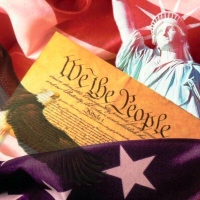
But wait, I hear you saying, it went to the ballot in this case. How did our republic fail us? Aha, that’s where the whole checks and balances thing comes in. Let’s examine an utterly ridiculous hypothesis to illustrate how this works.
A group of brunettes and redheads gets together and decides they have had it with blondes having more fun. They draw up a proposal, form a political action committee (PAC) and start campaigning. They manage to garner a bare majority for the proposal. The proposal aims to deprive blondes of the right to vote, own property and free speech.
In a true democracy it goes to vote, the majority wins and blondes stop having fun. But we don’t live in a true democracy. So how does it play out here?
The proposal would probably find a champion in the legislature. The champion sponsors the legislation. A bill is proposed and consequently fiercely debated. Ideally, the legislators see the blatant unconstitutionality of the bill and do not pass it. But what if they don’t and the bill passes? It’s not over yet.
The enrolled bill goes to the President. Ideally he also sees how against constitutional principles the piece of legislation is and vetoes it. But what if he doesn’t? There is a final recourse.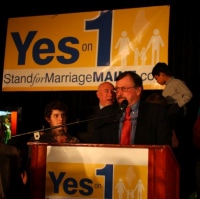
Unhappy blondes craft a lawsuit against the government for depriving them of their inalienable rights. They cite the Fourteenth Amendment. The case wends through the judicial system and likely lands on the doorstop of the Supreme Court. Here’s the cool thing about Supreme Court Justices. Unlike Legislators or the President they are not elected but appointed. For life. As a result they tend to be far less concerned about the will of the majority and far more concerned with upholding the Constitution. Therefore, when they hear the case they can’t help but come to the conclusion that the law is unconstitutional and can not stand. Checks and balances work, blondes regain their civil rights and peace is restored to the land.
Some States allow for the people to put issues to referendum, States like Maine. But even if an issue goes to referendum, the people can contest its outcome through the judicial branch. And in this case, if the anti-blonde movement successfully passed a referendum, and the blondes sued, we’d have the same result. The judiciary ruling in favor of civil rights and blondes having more fun.
Obviously my example is meant to be facetious. But don’t let its humor diminish its meaning. Denying civil rights is no laughing matter. Fighting for them is serious business.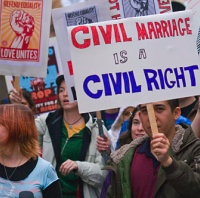
Our founding fathers created our government as a constitutional republic for good reason. To protect us from each other. A constitutional republic prevents your neighbors from putting your rights to homeownership to vote. It protects your spiritual practices from criminalization. It ensures all citizens are afforded life, liberty and the pursuit of happiness regardless or race, creed, ethnicity or sex. I have yet to find a provision which excludes that right based on sexual orientation.
The civil rights of entire class of citizens should not be determined by popular vote. If we had waited for a majority of the American voters to support desegregation, we might still be drinking from separate water fountains. When civil rights come under attack we can look to the three branches of government. If the legislature fails, we can turn to the executive. If the executive fails, we go to the judicial. The checks and balances inherent in the system provide many opportunities to right wrongs. It is up to us to seize these opportunities and promote civil rights for all.
Shannara Gillman is a non profit director, amateur actress and mother of one fantastic girl. She lives in Portland, Maine with too many animals and not enough time.
